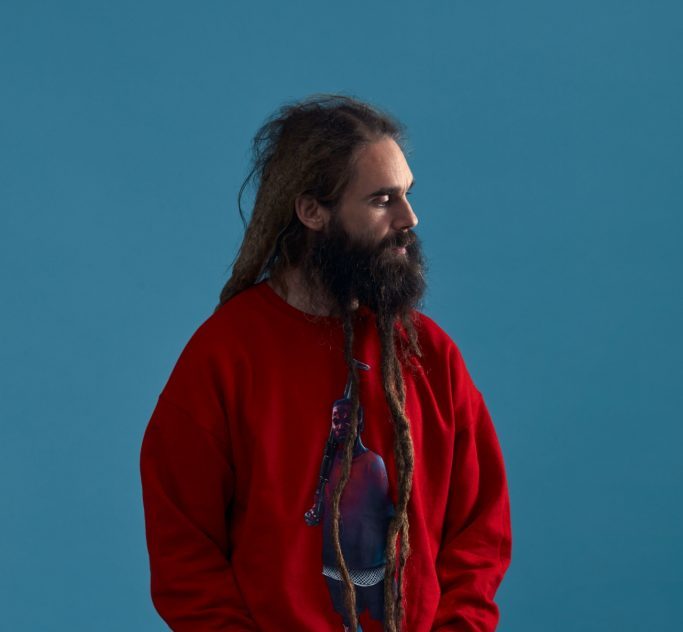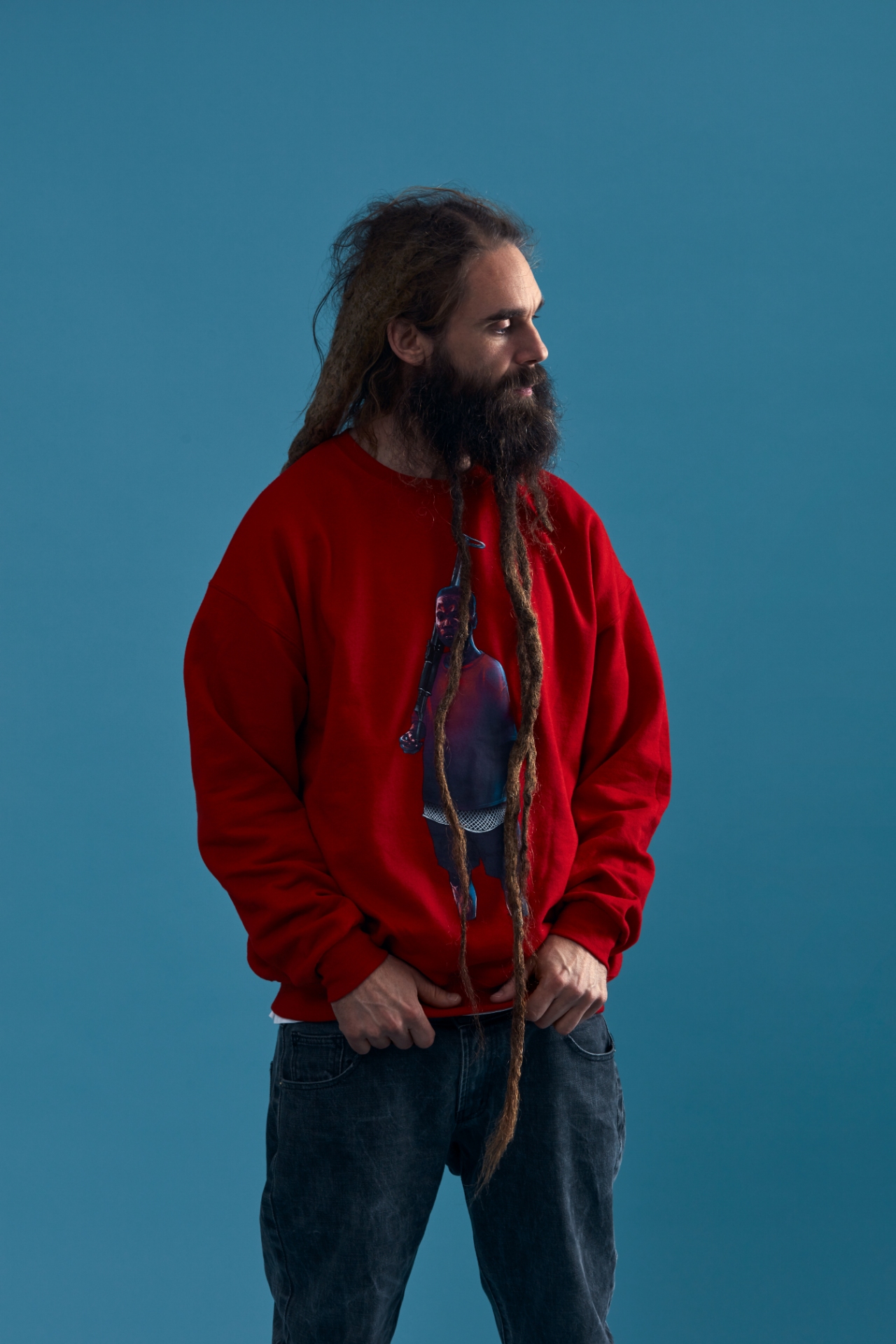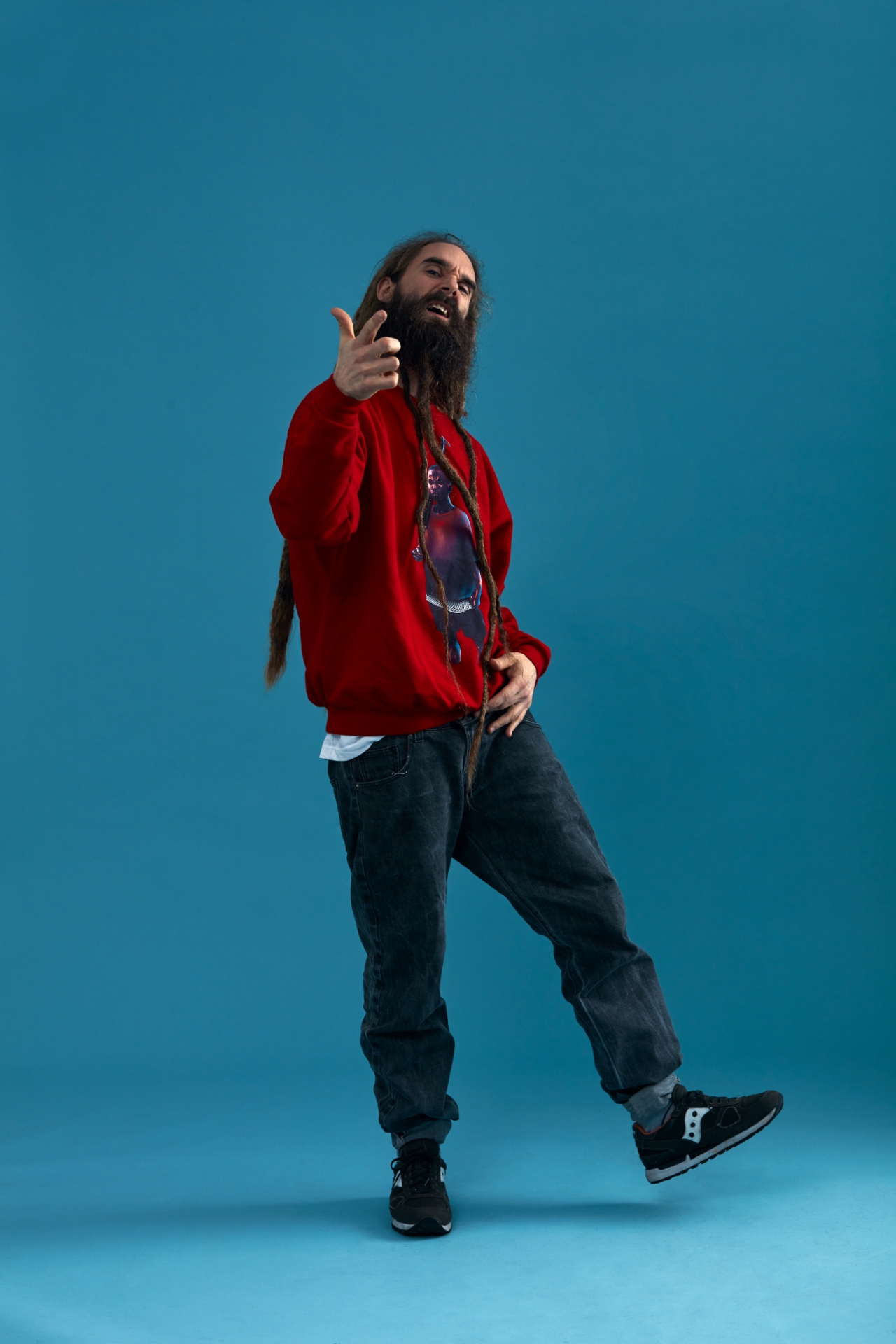Have you heard about the one and only Looptroop Rockers – a graffiti inspired hip hop group from Sweden? Yes, the same one which a lot of rap music lovers around the world, including myself, have admired since the early 00’s. Tracks like “Fly Away”, “Struggle Continues”, “Don’t Hate The Player”, “Bandit Queen”, “Looking For Love” and many-many others have given us comfort and lived in our hearts ever since. The rapper who goes by the name of Promoe (birth name Nils Mårten Ed), a founder of the group and who’s also known as a solo artist, hasn’t been resting. Instead, he has been busy with law studies and music. In the end of April he released his new album titled “The Art of Losing”, produced by Isak’sSon (Cosmic). We got an opportunity to ask about the old days, life in music and his new LP. Have a good read about Promoe’s past, present and the future!
Mårten, please tell me when and how did you find hip hop in your life?
In 1986 I started listening to music and I started doing graffiti. Me and a friend got influenced by the few records we could get a hold of. His older cousin was dating one of the few graffiti writers in Västerås back at that time, so he had a little connection that way. We read Subway Art, Spraycan Art and watched “Style Wars” a lot at that time. The music was secondary at first, but then in 91 I wanted to try it out. Producer Embee went to the same school as me, so we started recording songs in his bedroom studio.
Have you ever wondered, why you chose hip hop among the other subcultures around us?
Back then there were not as many subcultures to choose from as now. You could get in to glam rock or pop, but these wasn’t really subcultures.
There was nothing like hip hop. I didn’t understand much about it at first, but I was drawn in by the rebelliousness I guess. And that it was colorful. The reason I stuck to hip hop through all the years, and still do, has a lot to do with how the political aspects of it really blended well with my personality. There are a lot of stereotypes too, so I needed to find my own language, or niche, within the hip hop universe. This has been very rewarding, and it has made me grow.
How did you come up with the alter ego Promoe?
“Pro” stands for professional, which I wanted to be, even way before I knew I was a professional dreamer. I just wanted to be a pro at something, I was around 16. “Moe” is for Mårten. Promo was also a word I heard a lot in hip hop around that time, even though I don’t know if I fully grasped the concept. A Tribe Called Quest had a B-side on a single called “The Promo” that inspired me.
As you said graffiti writing came before MCing. Do you still write?
I don’t write that often, but I think it’s one of those things that will never leave my identity regardless of how active I am. It has formed me into the independent and resourceful person. We had projects that needed to be done and we didn’t know how to do them. We got some tips from older heads, but most of them didn’t want to let us in on their secrets, cos that way it would make it harder for them, if I am allowed to guess. We couldn’t ask our parents naturally, so we just learned by doing.
This made us fearless of releasing our own albums, and creating our label David vs. Goliath further down the line. We never asked for permission earlier, so we didn’t need permission to record our music and put it out independently.
Let’s head back to the very beginning and talk about Looptroop Rockers days from your perspective. Give our readers some history. You and producer Embee started the project, but what is the longer story behind it?
Embee was in 7th grade, and I was in 8th back in 91. We had a mutual friend who knew we both liked rap music, so he invited us to his place to make a song. That’s the first song we did. Embee looped the intro of a Black Sheep track and I rapped over it. Embee still has the recording, and it’s kind of crazy. The sound and the attitude is a lot of fun. I mean, we were dead serious about it then, that’s why we have to laugh at it now. I’m rapping like I think I know things that I really didn’t know back then.
Next year we met Cosmic and started recording more songs with him. After a while we had a bunch of tracks that we wanted to release, so we made a tape. It was like an album, with an intro, a lot of songs and a cover with a track list. It’s called “Superstars”. We needed a name for the group as well, so we were choosing between Busted Loops or Looptroop. Embee wanted us to be Big Deal, but to me that sounded like a wack pop group from that time. We went with Looptroop and did our first live show around that time, in one of the parks in Västerås. It was a great feeling, even though we were too nervous to talk between the songs.
About two years later we linked up with Supreme at different house parties and asked if he wanted to join the group. We’re all from Västerås which is a small town where, back then, everybody who was into hip hop or skating gravitated towards each other. It was such a small movement that we wouldn’t hesitate to approach anyone that looked like they would be into hip hop.
I’m really happy for those days. We did a lot of fun stuff like loading up a baby carriage with record players, vinyl and a sound system and would go out into the streets or parks and just set up parties. DJing and rapping for our friends and anyone passing by. The cops would come, and we would pull the chords from the charging poles in the parking lot, and be like: we haven’t done anything…
What are some of the main highlights for you from those times artistically and professionally?
Every album is a highlight to me. A lot of the long tours all over the world as well. With such a long and kind of steady career it’s hard to pick something specific, but for me it was a big thing when Bobbito put out my song “Denmark Style” on vinyl, on his Fondl’em label. The US was a big inspiration, and the artists Bobbito was linked to were what we listened to around 97-00: Company Flow, Artifacts, Arsonists, Pharoah Monch and so on. Through our friendship with Typhoon from Copenhagen we got to meet, do shows, and record with many of them. This was before we could really make a living off of music, which is something that is a highlight in itself, that we’ve been able to do that for such a long time. Starting our label in 98 is a highlight. Going on tour in South Africa in 02 is a highlight. Going to Jamaica to record in 03 and 06 are highlights. There are so many…
Could you name a few favourite tracks that have stayed special for you from the Looptroop discography?
“Fly Away” – it was the first time I felt like I succeeded in writing something emotional, instead of just the battle rhymes I had been used to. That way I realized that hip hop as a language could be used to express other feelings than just anger. This was a cornerstone for me personally in becoming a more complete, less one dimensional person.
“Fort Europa” – this is still monumental for us, and it sums up so much of what we think is wrong with where we’re from. Not to be ashamed of it, but to understand that our wealth is coming from a system that uses the rest of the world; and a need to change that through the music. I started writing this in 03 already, so it took about two years to bear fruit. I like it when songs take time to grow, and then years later still are the songs we play towards the end of the shows.
You have worked as a solo artist, as well. Are you a team player or individual achiever?
I have been blessed to be both and to have been able to develop both sides. Traditionally I haven’t been the best team player, but working with the Troop over so many years has taught me to trust other people, and not have the constant need to control every process. I have realized what I’m good at and that other people are better than me at other things. It’s been good for me to understand my limitations and appreciate other people’s efforts. This is something that I still need to be better at.
As time went by, you decided to go study law. What was the trigger for putting creative process aside and dive into studies at that level?
My idea was to still focus on the music and just learn something new on the side. It’s been about three years now, and the studies didn’t really stay on the sidelines… You have to go all into it, because if you study law halfway it’s too hard to understand it. So it kind of took over. But I guess it was time for something new.
Music has been my full time job for a little less than 20 years and I’m really happy about that. I’m also happy to have the opportunity to still find new paths this late in life. It’s really not late, but I think many people tend to stick with what they know and what’s comfortable. Not to point fingers at anyone saying that they should “live more”. I wish more people had the opportunity to try different things. I’m sure a lot of structures in society and in the world keep a lot of people from being able to do that.
This reminds me of Looptroop’s underground hit “Long Arm Of The Law”. In which way challenging yourself in your personal life affects your musical creation and interpretation?
Yeah, I’ve been thinking about that too, as well as other tracks dealing with the law in different ways. I think I’ve had this interest since being a graffiti writer back mainly in the 90’s, even though I never thought about studying law then. But the reason why I’ve stayed on track and not dropped so far, is probably due to the questions that was raised in my youth; about the law and the injustices I met and I saw around me. I think I have had the need since then to try to understand the laws of the world that govern us all. By that I mean the legal laws, but also other kinds of systems, like the economic system as well. I’ve been raised by the philosophy of know your enemy. To destroy the system you need to understand it.
How hard was it for you to return to making music full time?
I haven’t returned, I’m still in school for a little less than two years. Me and Cosmic recorded “The Art of Losing” album, and one more in Swedish, this past summer. During the summers I’m so free that I’ve been able to almost catch up all the songs that I would have written if I hadn’t been in school. I still do shows on the weekends and some small week tours, but other than that I haven’t been able to work like I’ve been used to. Especially the constant writing has been switched to a constant reading instead.
How would you describe Scandinavian rap scene right now, compared to the time before the break you had?
It’s obviously a lot bigger. We also used to do a lot more shows in the other Scandinavian countries than artists can do now. The whole music industry has of course changed because of streaming. This has affected the sound of the music and the pace it is being consumed at. The major labels have regained their grip around the artists and the scene, but it seems like more people are trying alternative paths. Before we had our break, we were the only ones that were independent. It wasn’t really considered cool then. Most people wanted a big advance from a company and then think they would be set for life. That’s not how it works. This is truly a game for the long distance runners. Maybe more artists from the newer generations can see that quicker.
Talking about your brand new LP “The Art of Losing”, it seems to have a very meaningful name. What’s the story and philosophy behind it?
I’ve always lived by the philosophy that I can do and get anything in life, if I just concentrate and work hard for it. This album, or at least the title track, is about the realization that there are some things in life that you can’t get, no matter how hard you work for it. And the realization that there might be something that you can learn from that as well.
In my case I need to learn humbleness. If I can do that, I think I will be more in tune with the world around me, and not get so crushed when things don’t seem to go my way.
What role does losing play in your creative work and personal beliefs?
Losing is maybe just a limited way of looking at things.
If you can turn your losses into life lessons, then they can become wins instead.
Wise words. In my opinion, you have stayed true to oldschool hip hop vibe, but “The Art of Losing” has some 90’s UK jungle and reggae influences in it too. What was the inspiration for the beatmaker Isak’sSon and for you lyrically as well?
Isak’sSon aka Cosmic and I have known each other since 93 and we have shared a lot, especially the taste for music. In that way I think it’s perfect for us to make an album together. We both have a love for hip hop, 90’s UK jungle and reggae, as you say. It was a big thing that he started producing music, only like one year ago. And recording together was really effortless for us. I think we will do more projects together in the future.
In your opinion, what are the best words to describe the LP’s sound?
Musically I think you already summed it up pretty well.
The album as a whole to me represents spontaneity, joy, an effort to take responsibility and the newfound love for the craft of making music.
What can we expect from you in the near future?
In June my summer time off from school starts again. Maybe I’ll get back in the studio or maybe I’ll write a book. Hopefully there will be some nice shows as well.
Are you planning to come to Estonia at some point and give fans a concert to remember to?
As always we want to go everywhere where the people want to hear us. We don’t have a big machine backing us, so it’s all really organic: if there are enough people that want to see us, a local promoter will have to book us and we’ll be there. Just link up with us!
We hope to see Promoe perform in Estonia quite soon, so promoters take notice. Meanwhile you can enjoy his new album “The Art of Losing” via Spotify:
There’s also vinyl on the way! Keep an eye on the news. Promoe on Instagram and Facebook.
Photos: Mathias Fossum


